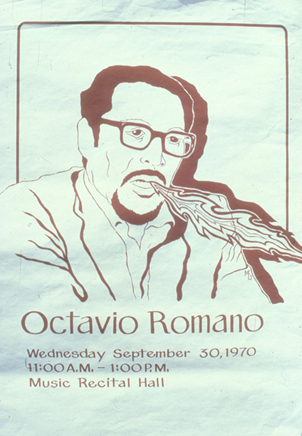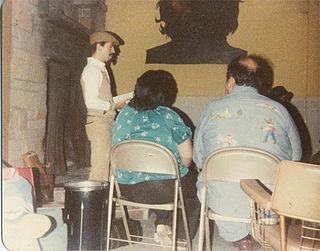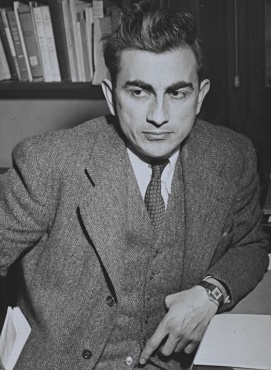
Chicano or Chicana is an ethnic identity for Mexican Americans who have a non-Anglo self-image, embracing their indigenous ancestry. Chicano was originally a classist and racist slur used toward low-income Mexicans that was reclaimed in the 1940s among youth who belonged to the Pachuco and Pachuca subculture. In the 1960s, Chicano was widely reclaimed in the building of a movement toward political empowerment, ethnic solidarity, and pride in being of indigenous descent. Chicano developed its own meaning separate from Mexican American identity. Youth in barrios rejected cultural assimilation into whiteness and embraced their own identity and worldview as a form of empowerment and resistance. The community forged an independent political and cultural movement, sometimes working alongside the Black power movement.

Jean-Louis Lebris de Kérouac, known as Jack Kerouac, was an American novelist and poet who, alongside William S. Burroughs and Allen Ginsberg, was a pioneer of the Beat Generation.

Oscar "Zeta" Acosta Fierro was a Mexican-American attorney, activist in the Chicano Movement and author. He wrote the semi-autobiographical novels Autobiography of a Brown Buffalo (1972) and The Revolt of the Cockroach People (1973), and was friends with American author Hunter S. Thompson. Thompson characterized him as a heavyweight Samoan attorney, Dr. Gonzo, in his 1971 novel Fear and Loathing in Las Vegas. Acosta disappeared in 1974 during a trip in Mexico and is presumed dead.

Vanity of Duluoz: An Adventurous Education, 1935–46 is a 1968 semi-autobiographical novel by Jack Kerouac. The book describes the adventures of Kerouac's alter ego, Jack Duluoz, covering the period of his life between 1935 and 1946. The book includes reminiscences of the author's high school experiences in Lowell, Massachusetts, his education at Columbia University, and his subsequent naval service during World War II. It culminates with the beginnings of the beat movement. It was Kerouac's last work published during his life. The tone of the book has been noted for its stark contrast to On the Road.
John Francisco Rechy is a Mexican-American novelist and essayist. His novels, are written extensively about gay culture in Los Angeles and wider America, among other subject matter. City of Night, his debut novel published in 1963, was a best seller. Drawing on his own background, he has contributed to Mexican-American literature, notably with his novel The Miraculous Day of Amalia Gomez, which has been taught in several Chicano studies courses throughout the United States. But, even after the success of his first novel, he still worked as a prostitute, teaching during the day, and hustling at night. He worked as a prostitute into his forties while also teaching at UCLA. Through the 1970's and 1980's he dealt with personal drug use, as well as the AIDS crisis, which killed many of his friends.

Quinto Sol was the first fully independent publishing house to surface from the Chicano movement in the Sixties. Editorial Quinto Sol was founded in 1967 at UC Berkeley by Octavio I. Romano, a Professor of Behavioral Science and Public Health, in collaboration with Nick C. Vaca and Andres Ybarra. The name "Quinto Sol" is Spanish for "Fifth Sun" and it refers to the Aztec myth of creation and destruction. Since the beginning of the Chicano movement in the 1960s, this concept has become a pathway to cultural expression. The Fifth Sun has constantly been integrated into the music, art and literature of the Chicano idea.

Caló is an argot or slang of Mexican Spanish that originated during the first half of the 20th century in the Southwestern United States. It is the product of zoot-suit pachuco culture that developed in the 1930s and '40s in cities along the US/Mexico border.

Daniel Anthony Olivas is an American author and attorney.

Alberto Baltazar Urista Heredia, better known by his nom de plume Alurista, is an American poet and activist. His work was influential in the Chicano Movement and is important to the field of Chicano poetry.

Chicano poetry is a subgenre of Chicano literature that stems from the cultural consciousness developed in the Chicano Movement. Chicano poetry has its roots in the reclamation of Chicana/o as an identity of empowerment rather than denigration. As a literary field, Chicano poetry emerged in the 1960s and formed its own independent literary current and voice.

Mexican American literature is literature written by Mexican Americans in the United States. Although its origins can be traced back to the sixteenth century, the bulk of Mexican American literature dates from post-1848 and the United States annexation of large parts of Mexico in the wake of the Mexican–American War. Today, as a part of American literature in general, this genre includes a vibrant and diverse set of narratives, prompting critics to describe it as providing "a new awareness of the historical and cultural independence of both northern and southern American hemispheres". Chicano literature is an aspect of Mexican American literature.
Nash Candelaria was an American novelist. He was known for a tetralogy of novels about the Rafa family. He has been called the "historical novelist of the Hispanic people of New Mexico."
Ronald Francis Arias is an American former senior writer and correspondent for People magazine and People en Español. He is also a highly regarded author whose novel The Road to Tamazunchale has been recognized as a milestone in Mexican-American literature.

José Antonio Villarreal was an American Chicano novelist. Villarreal was born in 1924 in Los Angeles, California, to migrant Mexican farmworkers. Like Juan Manuel Rubio in Pocho, Villarreal's father fought with Pancho Villa in the Mexican Revolution. He spent four years in the Navy before attending the University of California at Berkeley in 1950.

American literature in Spanish in the United States dates back as 1610 when the Spanish explorer Gaspar Pérez de Villagrá published his epic poem Historia de Nuevo México. He was an early chronicler of the conquest of the Americas and a forerunner of Spanish-language literature in the United States given his focus on the American landscape and the customs of the people. However, it was not until the late 20th century that Spanish language literature written by Americans was regularly published in the United States.

Ernesto Galarza was a Mexican-American labor organizer, activist, professor, poet, writer, storyteller, and a key figure in the history of immigrant farmworker organization in California. He had a dream of giving better living conditions to working-class Latinos.
Latino literature is literature written by people of Latin American ancestry, often but not always in English, most notably by Mexican Americans, Puerto Ricans, Cuban Americans, and Dominican Americans, many of whom were born in the United States. The origin of the term "Latino literature" dates back to the 1960s, during the Chicano Movement, which was a social and political movement by Mexican Americans seeking equal rights and representation. At the time, the term "Chicano literature" was used to describe the work of Mexican-American writers. As the movement expanded, the term "Latino" came into use to encompass writers of various Latin American backgrounds, including Mexican, Puerto Rican, Cuban, and others.

The Chualar bus crash took place on September 17, 1963, when a freight train collided with a makeshift "bus"— a flatbed truck with two long benches and a canopy— carrying 58 migrant farmworkers on a railroad crossing outside Chualar in the Salinas Valley, California, United States, killing 32 people and injuring 25. Because the vehicle was actually a truck carrying people in the back, rather than a bus, the crash is ranked as the deadliest automobile accident in U.S. history, according to the National Safety Council.
Elizabeth Martinez is a librarian whose career has focused on bringing diversity, multiculturalism and equality to public libraries and information policy. In 1966 she was the first Mexican American librarian to serve in the state of California. Martinez has served as a library administrator, professor, Executive Director of the American Library Association, and other roles throughout her career.











